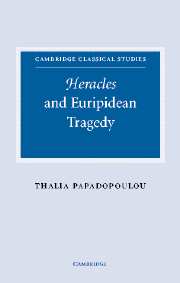2 - Madness and the gods
Published online by Cambridge University Press: 22 September 2009
Summary
Introduction
The central event of Heracles is the hero's murder of his wife and children in a fit of madness directly caused by Lyssa but ultimately induced by Hera's will. Divine involvement and human agency are thus brought together and are problematized by the dramatic device of madness. In this chapter I shift the focus to an examination of the interrelated themes of madness and the role of the divine in the play, setting them against the wider background of other presentations of madness and divine causation in Greek tragedy and especially in Euripides.
The typology of Heracles' madness
Madness is a broad, multi-faceted subject, as anyone trying to define it soon discovers. Each period or culture in human history from antiquity to nowadays has its own systems of recognizing and describing madness, its nature, types, causes, symptoms, development and cures. To look back at ancient cases of madness with the help of what is known about madness in the modern world may often enrich our understanding of these cases; for example, we may conclude that an ancient description of madness approximates to what nowadays and in current terminology would be identified as ‘X’- category of madness. It has often been noticed, for instance, that Orestes' madness as portrayed in Orestes is close to what would be described nowadays as delirium.
- Type
- Chapter
- Information
- Heracles and Euripidean Tragedy , pp. 58 - 128Publisher: Cambridge University PressPrint publication year: 2005
- 1
- Cited by

